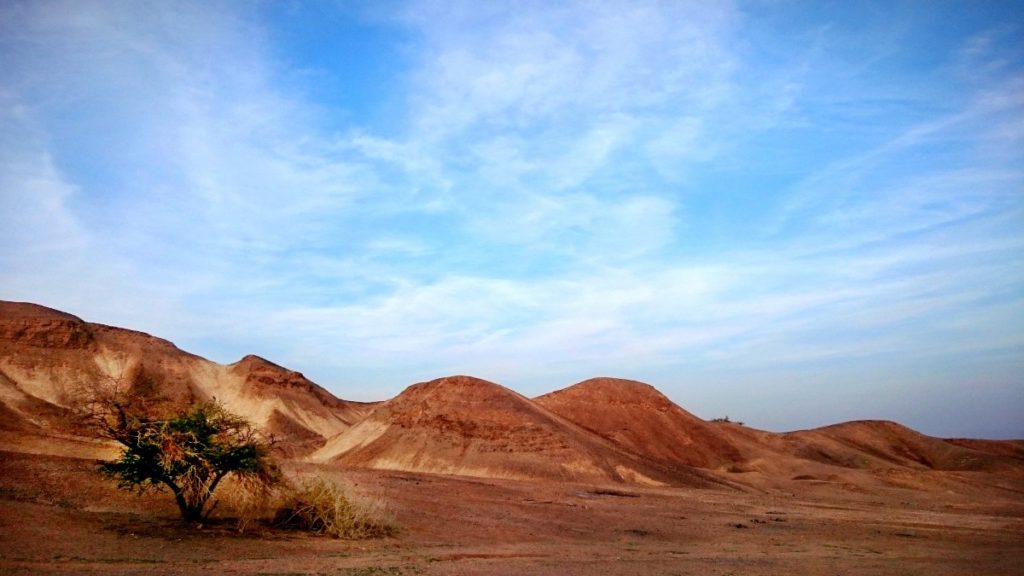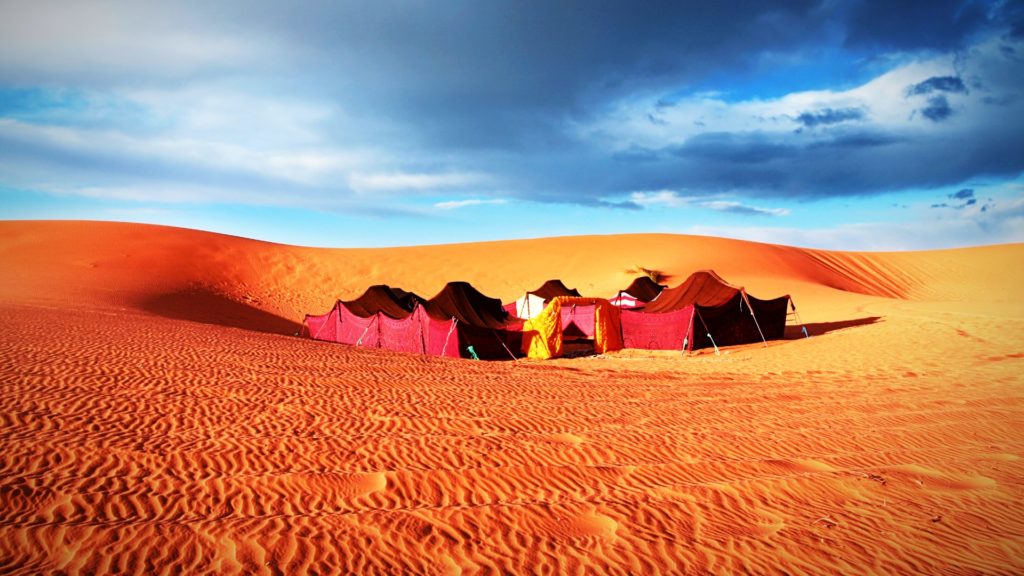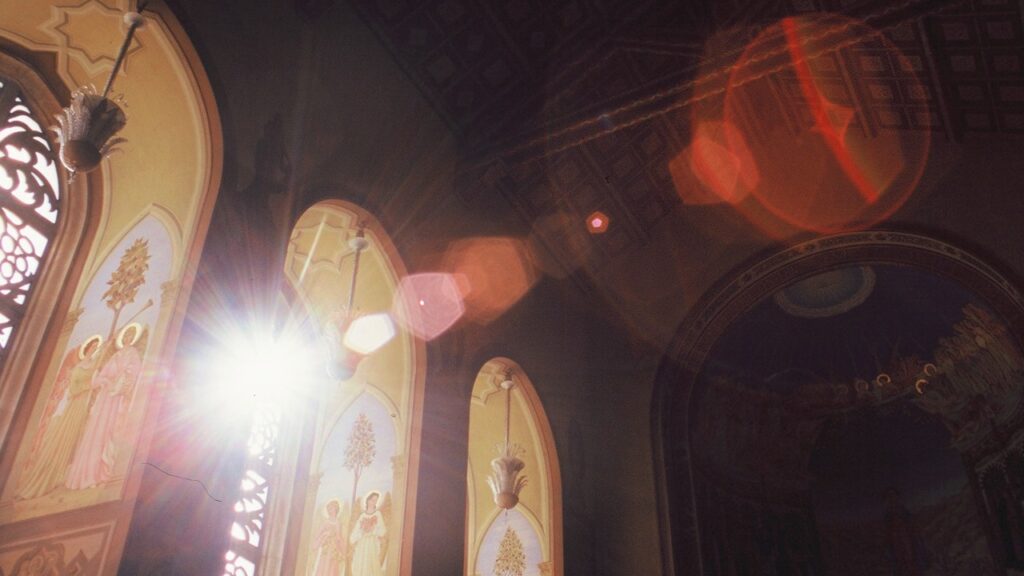All this talking about desert, sands, winds and flutes in the previous post, brought to my mind an Israeli song called שיר אהבה בדואי (Shir Ahava Beduee), or in English – A Bedouin (בדואי) Love (אהבה) Song (שיר).
This song is a couple of years older than me. It came out in 1978 and pretty much became an instant hit. It was written for a T.V show called Salon Talk which was hosted by the Yehonatan Geffen – one of Israel’s most prominent song writers. It was originally performed by its composer Itzhak Klepter, but the most well-known version of the song is by David Broza, who took over for Itzhak Clepter after he had left the show.
Here is an old clip I found on YouTube of an old live performance of Bedouin Love Song by David Broza. Broza is a gifted guitar player but if you want to skip the intro and get to the song, the singing starts at 01:09.
Here are the lyrics for the song in Hebrew followed by a rough translation of the whole song to English. Below them you will find some more explanations, thoughts, and another clip of live performance with a pleasant twist towards the end.
שיר אהבה בדואי
מילים: איציק ויינגרטן
לחן: יצחק קלפטר
צלילי חליל אל החולות של המדבר היה שולח
ליטף הוא את גופה הרך והסופה טרפה הכל
חדל להיות כמו החולות אני רוצה אותך כמו סלע
אז הבטיח לא לנדוד שוב כמו החול
כשהרוחות אותו ליטפו בעוז אחז במוט האוהל
אוזניו אטם הוא לא לשמוע לא לנשום כלל את הצליל
אתה נווד לחש מדבר אתה נקבר באוהל צר
והכבשים פעו בוואדי כמו חליל
הו הו הו הו הו קול קורא לנדוד לנדוד
הו הו הו הו הו קול קורא לנדוד לנדוד
וכשפרצו השיטפונות שכח את כל מה שהבטיח
אל הצלילים של החליל הושיט ידיים בסופה
במחול טירוף בקני הסוף נסחף שיכור כמו חול ברוח
גם הסלעים פרשו כנפיים כמו אנפה
וכשחזר שוב על סוסו להעמיק את מוט האוהל
על היריעות היא בחוטים ובצבעים מילים רקמה
ברוך שובך בוגד אחוז היטב במוט האוהל
כי גם אותי סופה נודדת סחפה
הו הו הו הו הו קול קורא לנדוד לנדוד
הו הו הו הו הו קול קורא לנדוד לנדוד
Bedouin Love Song
Lyrics: Itzik Weingarten
Melody: Yitzhak Klepter
Sounds of a flute to the desert he was sending
He stroked her soft body and the storm devoured all
Stop being like the sands I want you like a rock
So he promised not to wander again like the sand
When the winds stroked him, he fiercely held the rod of the tent
His ears he covered shut not to hear not to breath the sound at all
You are a wanderer whispered the desert; you are being buried in a narrow tent
And the sheep bleated in the ravine like a flute
Wow wow wow wow, a voice calls to roam to roam
Wow wow wow wow, a voice calls to roam to roam
And when the floods broke out, he forgot everything he promised
Towards the sounds of the flute he reached his hands in the storm
In a mad dance in the reeds he was swept off drunk like sand in the wind
And the rocks also spread their wings like a heron
And when once again he came back on his horse to deepen the tent rod
On the fabric she embroidered with words and colors
Welcome back traitor, hold the tent pole firmly
As I was also swept off by a roaming storm
Wow wow wow wow, a voice calls to roam to roam
Wow wow wow wow, a voice calls to roam to roam
Bedouin
The term Bedouin refers to nomadic or semi nomadic Arab tribes which live the desert. It derives from the Arabic word بَادِيَة (Badiya) which means desert. Bedouin literally are those who dwell in the desert, but nowadays the word actually means nomad in Arabic. Speaking of nomads, let’s talk about how we say ‘to roam’ in Hebrew.
All roots lead to roam
The words נָדַד (nadad – to roam) and the word נַוָּד (navad – traveler, wanderer – written נווד without niqud) deserve our special attention. In the previous post we talked about the words חוֹל (chol – sand), חָלָל (chalal – space) and חַיָל (chayal – soldier), and how they all originated from the same primal two letter root ח-ל (chet-lamed). In the same manner, the words נדד and נווד both originate from the primal root נ-ד (nun-dalet), along with the word נַיָּד (nayad – mobile or portable) which doesn’t appear in the song.
The very basic meaning of the root נ-ד is to move. More specifically to move in either a very light manner, or in some kind of repetitive motion back and forth. Other words deriving from this root are תְּנוּדָה (Tnuda – vibration), נִיד (nid – subtle motion), נֵד (ned – standing wave) and the verb הִתְנַדְנֵד (Hitnadned – to swing).
By the way, the word נִדָּה (Nida) which refers to the impure state of women during menstruation also stem from this root. The reason is you need move away from them and keep your distance. The same goes for the word נִידּוּי (nidui) – the act of shunning or ostracizing.
Note the coincidental phonetic resemblance between the English word ‘nomad’ in and the Hebrew word נווד (navad).
Desert allusions and disillusions
I have known this song for many years and listened to it countless times. I even sang it and learned to play it on guitar. I always saw it as a very rough and outdoorsy love song with strong nature and desert motifs. But while working on this post I came to realize how sensual it is, and how much sexual symbolism it actually holds.

For starters, it doesn’t get much more phallic than a flute, a tent pole, and some reeds. Their feminine counterpart is obviously the ravine and probably also the sheep. On top of those we have a ferocious storms floods capable of sweeping of drunken people and turning rocks into birds – a rather poetic way to describe an orgasm, wouldn’t you agree?
At one point the woman even says to the man “I want you (to be) like a rock”. Come to think of it, I should have noticed it much sooner. Oh well, I guess I was too innocent.
Flood types in Hebrew
Hebrew has two words for ‘flood’. The word שִׁטָּפוֹן (Shitafon) which makes an appearance in this song usually refers to bodies of water overflowing a certain area. Flood in the biblical sense is the word מַבּוּל (mabul) which describes extremely heavy rain. You may know it from the story of Noah and the Flood, or נח והמבול as it is called in Hebrew.
Live in Masada
I will leave you with another live performance of the same song by the same singer, only almost 30 years later. (Singing starts at 01:09).
The venue of this performance is quite unique. It is the ancient fortress of Masada where several hundred Jews chose death over slavery in their rebellion against the Roman Empire. This context gives the words “Live in Masada” a whole new ring.
Stay in Touch!
Get the next post from Hebrew Monk directly to you inbox!
Don't like emails? Subscribe to Heberw Monk's Telegram Channel instead.




I played on the original recording of Bedouin Love Song. It is on the 1978 Yonathan Geffen album “Sichot Salon”. It features David Broza and Yael Levi. Here are the links to the entire record:
Spotify:
https://open.spotify.com/album/5D9MdxQgoHuTsaW1odSzlh?si=x42PbceHSECzZY3183q
Tidal master quality: https://tidal.com/album/110426650
Enjoyed this article.
Wow, such an honor to have you here. You must be a great musician. I really like this song. Whenever I drive my car in the south of Israel and this song suddenly gets played on the radio, it puts me in a great mood. Thank you subscribing and commenting!